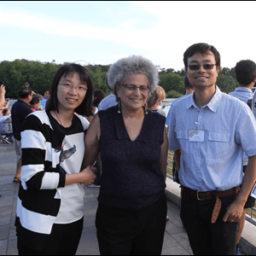Midway through graduate school at Massachusetts Institute of Technology, Vicki Bier encountered a crisis of confidence. The aspiring risk analysis researcher found herself lacking the inspiration to devour the latest journal articles on the inner workings of algorithms—and worried that her disinterest was a warning sign, revealing some personal shortcoming.
She stepped away from school for a year, taking a job at the consulting firm Arthur D. Little to work on risk analysis in the chemical and petrochemical industry. Exploring tangible problems like the risk of failure at a chemical plant and following high-profile questions about nuclear power risk in the news awakened a realization in Bier.
“I discovered that once I was working on something related to policy, I no longer felt uninterested,” she recalls, some 40 years later. “A lot of operations research really is about efficiency, and that was just never as interesting to me. It’s important; it’s good that there are plenty of people doing it, but it was not as interesting to me as something where I could see a broader societal relevance.”
Bier has carried that fervor for investigating timely topics with her ever since, including during her 30-year career at the University of Wisconsin-Madison. The professor of industrial and systems engineering is retiring Jan. 22, 2021, though she hopes to remain active as a researcher.
 Bier with former PhD students Chen Wang (left) and Jun Zhuang.
Bier with former PhD students Chen Wang (left) and Jun Zhuang.
Since arriving at UW-Madison in 1990 after working as a risk analyst at a consulting firm for clients in the nuclear power industry, Bier has tackled current and relevant issues such as homeland security resource allocation, the effects of deregulation on nuclear power safety, and pandemic preparedness. She recently received grants to study the gaps between human and machine learning and ways to incentivize preemptive moves away from areas at risk for coastal flooding, having previously examined the effects of forced relocations after nuclear accidents.
“A lot of my interests have been drawn from the news,” she says. “I have had an eye for problems where I thought progress could be made reasonably quickly, either because not enough people were thinking about something or because I had a different angle on how to think about it.”
As chair of the Department of Industrial and Systems Engineering for 5 ½ years, Bier facilitated standardization of the department’s design coursework.
“As chair, Vicki helped move the department forward,” says Harvey D. Spangler Professor and David H. Gustafson Department Chair Jeff Linderoth, who succeeded Bier as chair. “But perhaps what the faculty appreciated even more than her accomplishments as chair was the way she handled herself as a leader. She really focused on transparency of decision-making and followed strong shared governance procedures. She worked to make every faculty member’s voice be heard, and she was key to fostered our department’s collegial atmosphere. She was a tough act to follow.”
Bier has long taught ISyE 313: Engineering Economic Analysis (a course she says can be useful to every student, even if not necessarily provocative), along with courses in her areas of expertise, risk analysis and decision analysis.
Former PhD student Jun Zhuang (PhD ’08), now a professor at the University at Buffalo, has modeled his own decision analysis course after Bier’s. Zhuang, along with fellow PhD graduate Chen Wang (now an associate professor at Tsinghua University in China), organized a 2017 conference in China to honor Bier’s legacy and work in risk and decision analysis.
Zhuang remembers how Bier would bring hard copies of his research paper drafts—full of exhaustive handwritten comments and suggestions—to their one-on-one meetings, just as she would for each of her advisees. He’s tried to replicate that approach with his own graduate students, but says he can’t always match Bier’s thoroughness because of the intensive time commitment.
“She’s a lifelong mentor for me,” says Zhuang, who’s continued to meet with Bier since graduation to get her advice on career steps, research and mentoring.
Likewise, alumnus Jon Welburn (BS ’10, PhD ’16), now an operations researcher at the policy think tank RAND Corporation, remains in frequent contact with Bier; in fact, the two are collaborating on a paper examining systemic risks in the wake of the COVID-19 pandemic. Welburn started working with Bier as an undergraduate student and says she was the reason he stayed at UW-Madison to pursue his PhD, even though his focus on economics problems was outside of Bier’s established lines of research.
“She was quite supportive in pushing us to do the work that we wanted to,” he says.
Bier, who’s supervised 20 PhD students in total (plus one still in progress), points to watching her first PhD advisee, Naceur Azaiez (now a professor at the University of Tunis in Tunisia), as one of her enduring professional memories—much more than either of her own college graduations, which she didn’t attend.
Bier says she’ll miss visiting her campus office every day and bumping into faculty members and graduate students, all pursuing intriguing work. In that sense, the pandemic has offered a glimpse into her future.
She remembers feeling a sense of trepidation after turning down several academic jobs while working in consulting. She’s grateful UW-Madison has proven her instincts correct.
“The thing I’ve appreciated most about being at Wisconsin is the level of freedom that faculty have to choose what they want to work on,” she says. “I never felt constrained. There were a lot of people doing very interesting, eclectic, interdisciplinary work, and that was really important to me.”